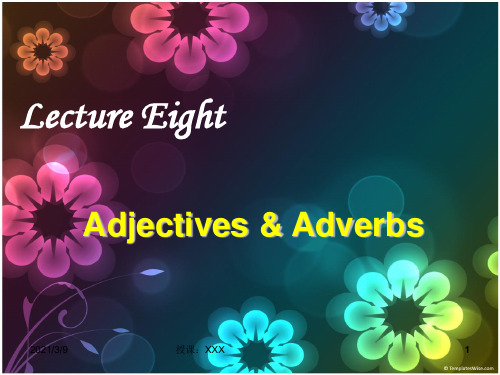- 1、下载文档前请自行甄别文档内容的完整性,平台不提供额外的编辑、内容补充、找答案等附加服务。
- 2、"仅部分预览"的文档,不可在线预览部分如存在完整性等问题,可反馈申请退款(可完整预览的文档不适用该条件!)。
- 3、如文档侵犯您的权益,请联系客服反馈,我们会尽快为您处理(人工客服工作时间:9:00-18:30)。
Det. Evaluation a an
Size/ Color Country Classi Noun -fier shape/age beautiful old red French hand- table made elegant little golden Swiss watch
Adjectives as Post-modifier in NP
Adjectives & participles
• Some adjectives are derived from –ing & -ed participles. –ing participle adjectives usually have active meanings, and –ed forms passive meanings, e.g. • • • • • • Active Meaning a terrifying story an exciting adventure boiling water an interesting book … Passive meaning a terrified woman an excited speaker boiled water an interested look
Notes:
• the only possible solution = the only solution possible • A young reliable man = a young man reliable • You have to wait in an entrance hall before being shown into the court proper. (strictly so called) • Students have to do a year‘s preparation before they start the degree course proper. (strictly so called) • Shellfish are not among the fishes proper. (in a strict sense) • Some more special terms: • Secretary General • Attorney General • Sum Total • Asia Minor ( the name for the main part of Turkey east of the Sea of Marmara, which is used especially when talking about the history and archaeology of this area)
Adjectives as modifier in NP
• Compare the adjectives used as modifiers in different positions, which give rise to different meanings, e.g. • There are many old men present. • What‘s your present feeling? • The person responsible (someone who takes charge of sth) • a responsible person (someone who is reliable, trustworthy) • Adjectives like concerned, involved, interested can be placed either before or after the noun party. • The concerned/involved/interested party= the party concerned/involved/interested • But with people we can only say: the people concerned/involved/interested
The syntactic functions of adj.
• Adj. as modifier (attributive) • Adj. as complement (subj. comp. & obj. comp. )
Adjective as modifier in NP
• When two or more pre-modifying adjectives are juxtaposed together, they should be ranked in the following order: • (Det.) + adj. of speaker‘s evaluation + adj. of size, shape, age + adj. of color +adj. of nationality, origin, material + adj. of use or purpose + noun head • Compare the following examples: • the English church • the old English church • the charming old English church • the town‘s charming old English church • his first two interesting little red French oil paintings
Classification: central adj. vs peripheral adj.
• According to the syntactic function, adjectives may be classified into central adj. and peripheral adj. • Central adj. can act as modifier and complement. • Peripheral adj. can only act as modifier or complement. • Examples of central adjectives: • The green house belongs to Tom. • The house is green. • John painted the house green. • Examples of peripheral adjectives: • This is utter/sheer/mere nonsense. • *The nonsense is utter/sheer/mere • The baby is asleep. • *This is an asleep baby.
Dynamic adj. can co-occur with imperative ―be‖ while static ones cannot.
• I persuaded him to be • *I persuaded him to be short / tall.
Dynamic adj. can be used in causative construction while generous/economical. static ones cannot
• The contrast of active and passive interpretation is also found in adjectives ending in –ful, -ous, some, -able/ible, e.g. • Active Meaning Passive meaning • Contemptuous contemptible • credulous, credible • respectful respectable • shameful ashamed • tiresomous endangered…
Classification: static adj. vs dynamic adj.
• Semantically, adjectives can be static and dynamic. • Static adjectives describe the static characteristics of animate or inanimate objects, e.g. tall, short, big, small, beautiful, etc. • Dynamic adjectives describe the dynamic properties of people or things, e.g. ambitious, careful, generous, helpful, witty, patient, etc.
The difference between static adj. and dynamic adj.
• Observe the following pairs of constructions, what difference can you see between Dynamicandcan go with the static adj. dynamic adj. progressive aspect of the verb ―be‖ • She is being ambitious. while static ones cannot. • *She is being beautiful. • Be patient / careful, please! • *Be beautiful / handsome, please!
Classification: gradable adj. vs non-gradable adj.
• Semantically, adjectives can also be gradable and nongradable. • Gradable adjectives have comparative forms and can be modified by intensifiers, e.g. clever, short, big, small, etc. • Non-gradable adjectives do not manifest comparative forms, nor can they be modified by intensifiers, e.g. biological program, Japanese car, perfect, excellent, extreme, etc.





